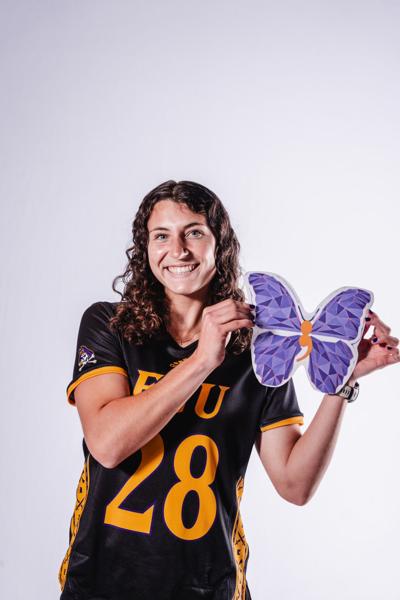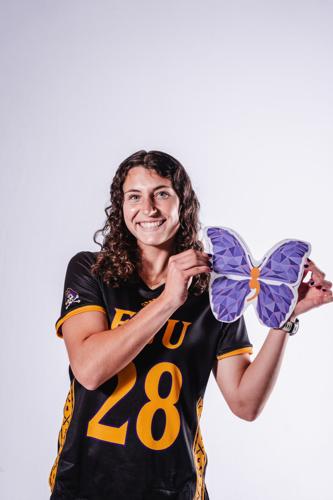This article is part of the Mental Health Collaborative, a project completed by nine North Carolina college newsrooms to cover mental health issues in their communities. To read more stories about mental health, explore the interactive project developed specifically for this collaborative.
In July 2019, Morgan Rodgers took her life. She was 22 years old, a student-athlete at Duke University, who was recovering from an ACL injury.
No one, except the pages of her journal, knew Rodgers was suffering from depression. Her mother said to NBC4 Washington, the reasons for Rodgers’ death were like puzzle pieces scattered everywhere and all she could do was search to put them together.
The non-profit organization Morgan’s Message was created by Morgan’s family members as a way to shine light on mental health awareness in student-athletes around the country. As mental health begins to become more discussed and highly prioritized, the stigma that showing emotion is weak or unnatural remains. Morgan’s Message aims to remind people that it is OK to seek help.
Senior East Carolina University lacrosse player Courtney Frank is a member of Morgan’s Message and an ambassador for the university. She said the story hits close to home for her because the lacrosse team has played Duke every year, since the team was created in 2018.
“I do feel like especially with an ACL – and that's one of the most common injuries with a lacrosse player that it does hit hard especially because she was from Duke,” Frank said. “Duke is like not a rivalry but we play them every single year. One of our teammates, her mom is the head coach at Duke so a lot of it ties into Duke and Morgan Rodgers.”
The stigma described by Morgan’s Message is still very much present today, ECU Athletics sports psychologist Jan Veinot said.
“We have this vision of an athlete and that athlete kind of adapts that facade. So they are less likely to reach out for help because they think they're supposed to be mentally tough,” she said. “And so that combined with the coaches, with every coach you’ve ever had telling you to ‘suck it up,’ ‘play through it,’ ‘get over it,’ — I gotta fight through because that's what I do in my sport.”
A 2021 study from the NCAA surveyed 9,808 student-athletes across the three different divisions and asked various questions regarding mental health. The study showed 47 percent of student-athletes said they are comfortable seeking support from a mental health resource on campus.
The study showed women are slightly more likely to reach out than men — possibly a reason the ECU Morgan’s Message Chapter doesn't have any male ambassadors.
Senior East Carolina University lacrosse player Courtney Frank is an ambassador for the university’s chapter of Morgan’s Message. She believes the stigma impacts men harder because they are not used to talking about their feelings.
“I do think a lot of them do struggle with mental health but they’re not as open to talk about it because as guys, I feel it’s like considered like they’re weak, even though it's not,” she said. “Everyone has their valid feelings for their mental health struggles.”
With the October hiring of Veinot — the first sports psychologist at ECU — came the introduction of anonymous forms coaches, players and support staff can fill out on behalf of a player. The form is sent directly to Veinot, who follows up with the athlete to try and set up a meeting. Veinot said the referrals come in from everywhere and have been working very well since their implementation.
Some skills Veinot teaches are breathing techniques to reduce anxiety and mindfulness to help control and limit the negative thoughts. Veinot said she is trying to meet with teams to assess what they need help with or what skill would benefit them most. After the meetings, she sets up a series of workshops with the teams. The more she can help the student-athletes in a group, the fewer reports come in — which is good, as it means there are fewer serious cases to be addressed.
Junior ECU volleyball player Merritt Woodson said she’s grateful for the addition of the sports psychologist position — even with student-athletes having access to the Counseling Center, where there are counselors available.
“It’s kind of like the convenience factor,” Woodson said. “We encourage all of our players to know you can talk to any of your teammates, your coaches, support staff but sometimes it is a lot easier to go talk to somebody that you’re seeing every single day.”
Frank said the Counseling Center explains things in a different way than Veinot, whose counseling is more focused towards student-athletes. Veinot played and coached collegiate women’s basketball for 25 years, so she understands more about what student-athletes are going through.
To bring more awareness to Morgan’s Message, most ECU teams have a dedication night where they wear the chapter apparel. For example, the volleyball teams wear ribbons in their hair and the soccer team have warmup shirts with the chapter logo on the front in purple and gold. Woodson said the announcer will usually say a few words about the organization and its mission.
According to the Morgan’s Message website, There are 4,824 ambassadors on 1,640 high school and collegiate campuses. There are programs and chapters in 46 states, England and Canada.
Woodson said she knew of a teammate who took a step back from the sport because it was getting too overwhelming. The team supported the athlete in her decision and she ultimately came back to play.
The study by the NCAA showed 78 percent of male student-athletes and 94 percent of female student-athletes felt overwhelmed with their load within the past month. These numbers have stayed relatively similar since 2020. The factors the study reported to be most impactful to the student-athletes mental health were academic worries (49 percent of women, 36 percent of men), planning for the future (40 percent of women, 31 percent of men), financial worries and playing time.
As ambassadors for Morgan's Message, Woodson and Frank hold monthly meetings with their teams. In the meetings, Woodson said they’ll talk about performance anxiety, burnout and just have conversations about different mental health issues the team might be facing.
The pair try to spread awareness and open conversations about mental health as they recruit student-athletes through the Student-Athlete Advisory Committee, a group made up of student-athlete representatives from all ECU sports.
Mental health is becoming more and more discussed as time goes on, but Woodson said there’s still much room to grow.
“I think that we're moving in the right direction but it's still difficult for a lot of people to overcome that stigma that they've grown up with and reach out and ask for help,” she said. “So that's what we're trying to help by having people on our teams and throughout athletics and everyone really, giving them a space to talk about their mental health and not be afraid.”
Woodson said she hopes in the future there will be at least one ambassador for Morgan’s Message on every sports team at ECU. She wants to continue to help eliminate the stigma around mental health and let other student-athletes know they have a space to “freely talk about their mental health and not worry about how it might make them look.”







(0) comments
Welcome to the discussion.
Log In
Keep it Clean. Please avoid obscene, vulgar, lewd, racist or sexually-oriented language.
PLEASE TURN OFF YOUR CAPS LOCK.
Don't Threaten. Threats of harming another person will not be tolerated.
Be Truthful. Don't knowingly lie about anyone or anything.
Be Nice. No racism, sexism or any sort of -ism that is degrading to another person.
Be Proactive. Use the 'Report' link on each comment to let us know of abusive posts.
Share with Us. We'd love to hear eyewitness accounts, the history behind an article.